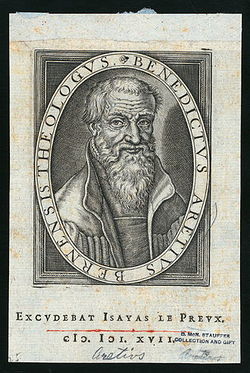Difference between revisions of "Benedictus Aretius (1522-1574), scholar"
Jump to navigation
Jump to search
| (3 intermediate revisions by the same user not shown) | |||
| Line 1: | Line 1: | ||
[[File:Benedictus Aretius.jpg|thumb|250px]] | |||
'''Benedictus Aretius ''' (1522-1574) was a Swiss NT scholar, reformed theologian, professor of Theology at Marpurg, and botanist. Best known for his study of rare plants living in the Alps, he also authored theological works and a popular exegetical commentary on the whole of the New Testament. | '''Benedictus Aretius ''' (1522-1574) was a Swiss NT scholar, reformed theologian, professor of Theology at Marpurg, and botanist. Best known for his study of rare plants living in the Alps, he also authored theological works and a popular exegetical commentary on the whole of the New Testament. | ||
==Works | ==Works== | ||
====Books==== | ====Books==== | ||
| Line 17: | Line 19: | ||
[[Category: | [[Category:A-Ar|Aretius]] | ||
[[Category:Swiss|1522 Aretius]] | [[Category:Swiss|1522 Aretius]] | ||
[[Category:Swiss Scholars|1522 Aretius]] | [[Category:Swiss Scholars|1522 Aretius]] | ||
[[Category: | [[Category:Born in the 1520s| 1522 Aretius]] | ||
[[Category: | [[Category:Died in the 1570s| 1574 Aretius]] | ||
[[Category: | [[Category:New Testament Studies|~1522 Aretius]] | ||
[[Category: | [[Category:Latin language|~1522 Aretius]] | ||
Latest revision as of 22:48, 15 December 2019
Benedictus Aretius (1522-1574) was a Swiss NT scholar, reformed theologian, professor of Theology at Marpurg, and botanist. Best known for his study of rare plants living in the Alps, he also authored theological works and a popular exegetical commentary on the whole of the New Testament.
Works
Books
Biography
- Wikipedia.en -- Wikipedia.de -- Wikipedia.fr -- WIkipedia.it -- Wikipedia.es
References
- Alexander Chalmers, Biographical Dictionary 2 (1812), p.425.
- BBKL.de
